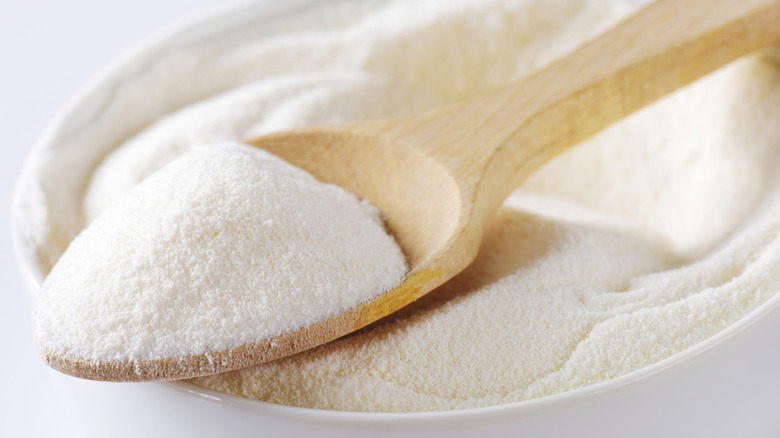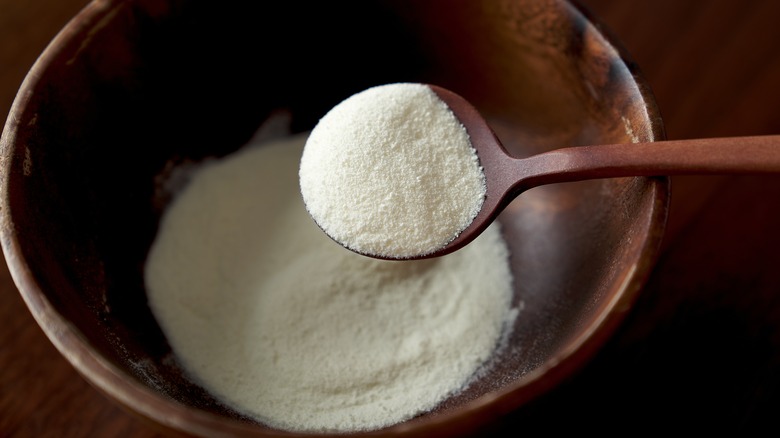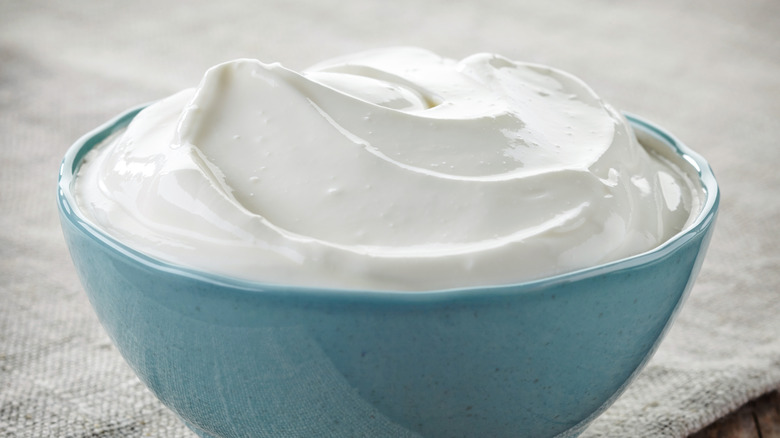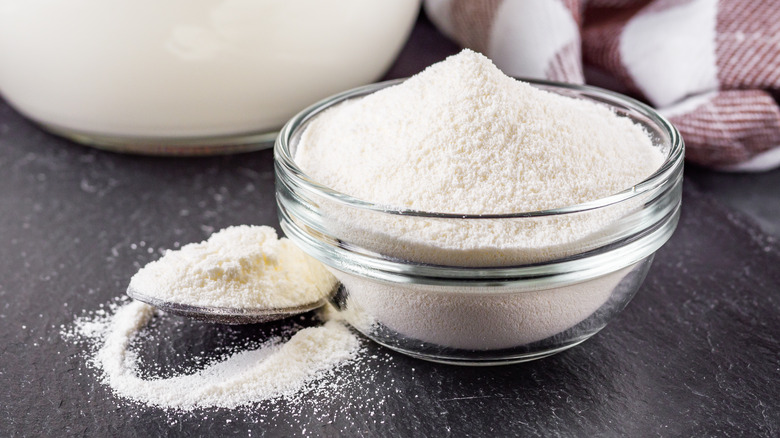What Is Powdered Sour Cream And When Should You Use It?
We may receive a commission on purchases made from links.
No matter where you live, it's never a bad idea to have non-perishable versions of important fridge stables on hand. Things like evaporated or condensed milk and dehydrated eggs have been a no-brainer since the 20th century. But thanks to evolving food technology, there are more shelf-stable options for perishable foods than ever before, including non-essential items like heavy cream, butter, and — believe it or not — sour cream.
Granted, you wouldn't necessarily be worried about having sour cream on hand for any emergency scenarios or long-term power outages. But having the option is better than nothing. Powdered sour cream allows you to make all kinds of food during occasions where it might not be practical to bring fresh sour cream due to its easy-to-spoil nature. It's also great for home cooks who don't use it often enough to justify buying a whole tub, but still need sour cream for the occasional recipe.
Whether you're stocking up for an emergency, hoping for an easy round of snack dips on a camping trip, or just want to have quick and easy access to sour cream in a pinch, powdered sour cream is a convenient alternative — one well worth considering for any sour cream lover.
What is powdered sour cream and how is it made?
Like many other dehydrated dairy products, powdered sour cream is just fresh sour cream that's had all of its moisture extracted through a process called spray drying. Essentially, the sour cream is forced through spray nozzles, which break it up into individual droplets of the tiniest size possible. Those droplets are then dried in a hot air chamber, and the droplets' small size ensures the moisture quickly evaporates without the need for higher temperatures — resulting in an efficiently and consistently dried product.
To reconstitute the powder into sour cream again, you simply reintroduce the moisture that's been removed. While the process isn't perfect or lossless, many powdered sour cream products retain the fresh version's signature tangy flavor.
Generally, the shelf life of powdered sour cream goes up to a few years, but can vary depending on the brand. While some powdered sour creams can last up to 10 years, it's best to check your individual carton to see how long it lasts after opening. How much butterfat content has been left in the powder can alter its expiry date, as well (which may also affect its texture when reconstituted).
Powdered sour cream vs. fresh sour cream
Unfortunately, reconstituted powdered sour cream isn't identical to fresh sour cream by any stretch of the imagination. Depending on the brand, there can be some massive differences in both taste and texture. While fresh sour cream is tangy, smooth, and even somewhat refreshing, reconstituted sour cream can range anywhere from a close imitation, to a markedly sour-tasting and smelling product with a brittle and unpleasant mouthfeel.
Your mileage may vary greatly, even with the same product from the same company. In fact, customer feedback on many powdered sour cream products features a wide array of reactions regardless of the brand — from high praise for a product's fidelity, to scathing remarks on how it tastes more spoiled than edible. Given the wide range of reactions, choosing the right brand for you — as well as determining if powdered sour cream is for you at all — may come down to a matter of trial and error.
However, there are a few ways to know what you're signing up for when shopping for powdered sour cream. A higher butterfat content means the powdered sour cream will taste creamier and closer to fresh — though, as mentioned above, the tradeoff is a shorter overall shelf life. Sour cream powder made with nonfat milk may stay good up to 10 years with proper storage, while one with a high butterfat content will likely only last between three and five years.
How to cook with powdered sour cream
While the instructions on any carton of powdered sour cream makes it sound as simple as adding water, there are myriad ways to upgrade your reconstituted sour cream that shouldn't be overlooked. Like with cake box mixes, it takes very little to morph powdered sour cream into an easy, convenient, and delicious (rather than vastly inferior) substitute.
The first tip is to use whole milk or buttermilk instead of water to up the fat content, which will result in a much creamier product. Another way to do this is to add some powdered heavy cream into the mix for an elevated texture much closer to fresh sour cream. Some powdered sour cream users also recommend making the sour cream in advance, then storing it in the fridge to let the taste and texture settle before consumption.
On the flipside, powdered sour cream can be helpful as a cooking and flavoring ingredient akin to cream of tartar or garlic salt. Powdered sour cream performs excellently across the board when used in recipes that already have their own moisture, such as soups, creamy sauces, and dishes like stroganoff. It also adds an extra layer of flavor and creaminess to baked goods, making it an excellent pantry staple to keep on hand for any kind of cooking or baking.
Where can you find powdered sour cream?
As a more recent invention, powdered sour cream isn't apt to be well-stocked in grocery stores (unlike other dehydrated dairy products). While they might be spotted at very large grocery retailers, or some specialty stores (if you're willing to scout around), the quickest and easiest way to get your hands on powdered sour cream is to order it online.
You can find a small selection of powdered sour cream products on Amazon, from brands like Hoosier Hill Farm and Judee's (both of which also have extensive selections of other powdered dairy products). Many powdered sour cream products are also sold from independent company websites, and it may be worth exploring outside of online shopping platforms to find any local brands to your liking.
Alternatively, if you'd rather physically look at a product before committing to a purchase, you can see if your local Walmart has any powdered sour cream in stock. Reaching out to your local grocery retailer, specialty food stores, or co-ops (those that focus on natural or organic products) likely won't hurt, either, as they may stock powdered sour cream — or have access to it on request.




